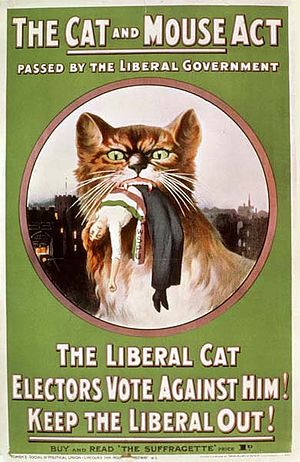| Act of Parliament | |
 | |
| Long title | An Act to provide for the Temporary Discharge of Prisoners whose further detention in prison is undesirable on account of the condition of their Health. |
|---|---|
| Citation | 3 & 4 Geo. 5. c. 4 |
| Dates | |
| Royal assent | 25 April 1913 |

The Prisoners (Temporary Discharge for Ill-Health) Act 1913, commonly referred to as the Cat and Mouse Act, was an Act of Parliament passed in Britain under H. H. Asquith's Liberal government in 1913.
The Cat and Mouse Act was passed by Parliament as a response to members of the Women's Social and Political Union (WSPU, commonly referred to as suffragettes) utilizing hunger strikes as a form of protest while they were imprisoned for acts of vandalism in support of women's suffrage. The hunger strikers were force-fed by the prison staff, leading to a public outcry.[1] The act allowed for the prisoners temporary release when their hunger strikes began to impact their health; they then had a predetermined period of time in which to recover after which they were rearrested and taken back to prison to serve out the rest of their sentence. Conditions could be placed on the prisoner during the time of their release.[2] One effect of the act was to make hunger strikes technically legal. The nickname of the act came about because of the domestic cat's purported habit of playing with its prey, allowing it to temporarily escape a number of times, before killing it.
- ^ "Forcible Feeding: Medical Report". Manchester Guardian: 6. 24 August 1912.
- ^ "Chapter 4". Prisoners (Temporary Discharge for Ill-Health) Act, 1913. 25 April 1913.